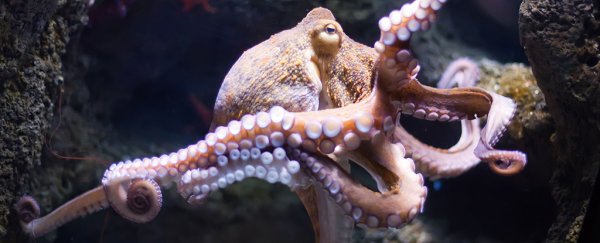When Octavius the octopus arrived at the University of Georgia's Marine Education Center and Aquarium in August, they were holding onto a secret. Well, ten thousand secrets, to be precise.
Despite the name, it now turns out that Octavius is female. But the real surprise was that she also happened to be pregnant; the keepers had no idea until early last week, when she gave birth and turned her tank into a veritable snow globe of cephalopod eggs.
"I noticed this cloud of moving dots and I realised, 'Oh my God, she had babies. There are babies. There are babies everywhere.' And a sort of panic ensued," aquarium curator Devin Dumont told Mary Landers at Savannah Now.
"I immediately started scooping them out and putting them in buckets and there were just buckets and buckets and buckets full of tiny octopi."
Finding a tank full of baby octopuses (or octopodes for language pedants) would certainly be enough to shock anybody into mixing up their Greek and Latin word roots.
Dumont didn't know Octavius's sex when he received the delivery of the common octopus (Octopus vulgaris) from Charleston's South Carolina Aquarium. it had been caught in the wild, and nobody had stopped to check the octopus's gonads.
Female octopuses can store sperm until conditions are perfect for the fertilisation and release of eggs, so it's likely Octavius was waiting for the right moment to start her family of thousands.
It was during a routine tank clean that Dumont found the aquarium now had a nursery. The only clue Octavius gave to her imminent arrivals was a quiet retreat into a rocky crevice in the corner of her tank last month.
"The mother will protect the eggs in her den and waft or aerate or fluff them," says Dumont.
Each egg is barely visible to the naked eye, and soon hatches into an equally tiny larva. Given how cute they are, they should be given a better name. Like 'squee', perhaps - check them out in the clip below.
That said, it might be better not to get too attached. Even in the safe confines of captivity, baby octopuses are notoriously challenging pets. There's a chance every one of those ten thousand or so larvae could perish.
Depressingly, Dumont could quickly go from thousands of octopuses to zero, since Octavius might also not be long for this world. Mother octopuses are known to starve themselves after giving birth.
"After they're all done hatching out she dies shortly after," says Dumont.
"She gives the last part of her life to her kids to protect them."
Octopus mothers really do deserve some sort of prize for their efforts. Octavius is a champion for doing it all on her own! In the wild, members of some species congregate in massive nurseries.
And really, her fate could have been a lot worse. It's not like she became lunch for failing to predict the 2018 World Cup results.
Dumont is giving the new arrivals a good shot at survival, returning some to the wild to fend for themselves while raising others at the research laboratory next door.
Common octopus populations have never been evaluated, most likely as nobody has really considered them to be under threat. So it's fair to presume they're not exactly rare.
Still, octopuses of all varieties are pretty amazing animals.
Let's hope Octavius leaves a legacy, and Marine Education Center and Aquarium visitors continue to have eight-legged molluscs to marvel for a long time to come.
